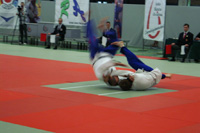|
|
|
 |
|
Types of competition in Ju Jutsu
Random Attack
Keywords:
Reaction, effectiveness, applicability, reality
|
| Random Attacks is a spectacular and attractive competition form combining speed and efficiency into a realistic Self Defense technique outside the protective school or club environment. It is the perfect competition form for traditionnal Ju-jutsu, Tai-jitsu, Aikido, Aiki-Jitsu, Hapkido, Combat Sambo, Krav Maga, Close Combat, and many others |
 |
Random Attacks as a competition form is open to 9 year old children upto adults + 40 years. Categories are based on gender, grade and age for local and National competitions. For International competitions categories are made on the basis of gender and age.
Random Attacks are a form of competition were the contestants will sharpen their speed of reaction and demonstrate their skills and techniques within safe perimeters.
Procedure and rules shortly
The rules presented here are based on the rules of the „Euro Budo international“. The rules can be downloaded from the appropriate download section as a PDF file.
“Random Attacks” is a form of competition were the contestants don’t fight against each other but will demonstrate their self defence skills on random attacks from their partner. The attacks will be determined by the Referee.
Speed of reaction in combination with the execution of a good and efficient technique will decide the result of the contest. The contestant doesn’t know in advance which attack will come. On signal from the Referee the partner will execute one of 40 attacks.
- Two pairs will compete again each other and the defender will be judged.
- The officials will assign a red belt and white belt to each pair.
- Each pair has an attacker and defender
- The competition table calls the attackers to be given the attack from a picture or drawing
- The attackers return to their positions on the mat.
- The Referee will then instruct one of the attacker to attack.
- The number of attacks is tournament- and age dependent
- When the Judges are asked for a decision they will raise on signal from the Referee “Hantai” the relevant flag (red of white).
- The Referee point to the winner.
Profit and loss is through flags (red & white) announced. The candidate with the most flags is the winner. Outside the responsiveness, variation and technical skills, the jury will also take the realistic execution in consideration.
Attack techniques
The attack techniques as illustrated boards are available for download as a PDF file.
| 1. Lateral strungle both handed |
21. Side kicks(frontal) |
| 2. Wrist grip (same side) |
22. Clinch fom front (without armes) |
| 3. Direct strike |
23. Upper cut |
| 4. Clinch from behind (with armes) |
24. Frontal knifestitch to the abdomen |
| 5. Wrist grip (diagonal) |
25. Double wrist grip from behind |
| 6. Frontal kick |
26. Forehand knife cut vom above |
| 7. Roundhouse punch |
27. Strangle with two hands above partner |
| 8. Wrist grip (bothhanded, both) |
28. Bothsided lapel grip, Head strike |
| 9. Strungle from behind, bothhanded |
29. Strike to the head, above partner |
| 10. Bothhanded strungle from front |
30. Gun from front (Chest) |
| 11. Hair grip from front (onehanded) |
31. Headlock from front |
| 12. Forehand strick strike to the head |
32. Lateral backhand knife cut |
| 13. Lapel grip from behind (onehanded) |
33. Knife stitch vrom above |
| 14. Headlock from front |
34. Strungle; between the legs |
| 15. Clinch from front (with Arme) |
35. Gun from behind |
| 16. Backhand stick strike to the head |
36. Forearm strungle from behind |
| 17. Lateral strungle in the ground |
37. Police grip |
| 18. Roundhouse kick |
38. Full Nelson |
| 19. Lapel grip and punch |
39. Frontkick + strike to the head |
| 20. Clinch from behind (without arms) |
40. Double roundhouse punch |
Source: http://eurobudo-int.com

|